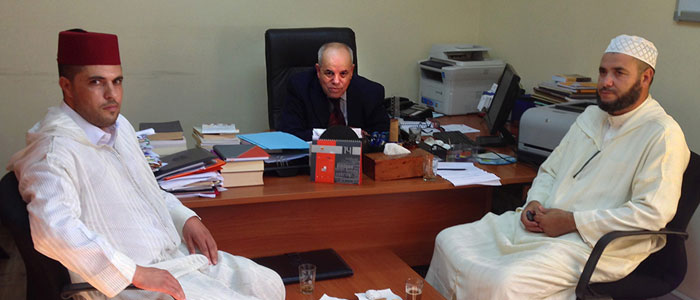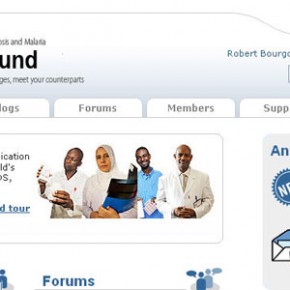* This article was published in the Global Fund Observer (English – French), Aidspan‘s newsletter.
In July 2014, in a meeting room in the Moroccan capital Rabat, a young Moroccan woman stood up and addressed an audience composed of senior representatives from international organizations and government — including the Ministry for Islamic Affairs and the prison system. Speaking in Arabic, she announced herself as « a representative of the sex workers of Morocco ».
Her bravery was matched equally by two other young men who also stood up during that meeting: one, a member of Morocco’s gay community; the other, a representative of people who inject drugs.
 Bearing witness to the courage of these three young people is driving a perceptible and noteworthy shift in the way Boutaina Selma El Omari works, coordinating the Global Fund’s Program Management Unit at the Ministry of Health — and the way Morocco will, going forward, be developing its proposals for Global Fund support for HIV.
Bearing witness to the courage of these three young people is driving a perceptible and noteworthy shift in the way Boutaina Selma El Omari works, coordinating the Global Fund’s Program Management Unit at the Ministry of Health — and the way Morocco will, going forward, be developing its proposals for Global Fund support for HIV.
The three advocates were meeting with other members of Morocco’s new country coordinating mechanism (CCM), representing disease-affected populations in a way that has never before been seen — not in Morocco nor in most parts of the Middle East and North Africa region, explains El Omari.
The selection of 5 voting members (out of 33) to represent vulnerable and most-at-risk populations (the other two represent people living with HIV and affected by TB) was a complex and sensitive project that had to be conducted independently, under the supervision of a notary, recalls Boutaina El Omari: “There is no association representing those groups because it’s illegal [homosexuality, prostitution, drug use]. So we had to work with civil society groups that collaborate with them. All thematic NGOs were involved in the process”.
The Global Fund, common sense and the King
Morocco’s human rights landscape is evolving for a number of reasons, many of which could have a positive effect on the way the country responds to its HIV epidemic. The right to access health services, the right to respect for human dignity, the right to discretion and privacy: all are becoming normative in the traditionally conservative Kingdom, which was among the only countries in the region that did not experience any upheaval during the Arab Spring.
And while the nearly $38 million allocated to Morocco under the Global Fund’s new funding model (NFM) for TB and HIV is a modest sum, the requirements accompanying the disbursement of those resources are also helping to fuel this quiet rights revolution.
 « The ground was ready » for the new requirements placing key populations at the heart of the proposals to support the national HIV response, says Mustapha Ouchrahou, the permanent secretary of the CCM. « It’s the culmination of many years of work — within the CCM and in the field. »
« The ground was ready » for the new requirements placing key populations at the heart of the proposals to support the national HIV response, says Mustapha Ouchrahou, the permanent secretary of the CCM. « It’s the culmination of many years of work — within the CCM and in the field. »
It’s also indicative of the new approach to HIV that has taken root within the health ministry, adds El Omari. « Since the beginning of the epidemic, the ministry has understood the need to work with these groups », she says. For one simple reason: two thirds of new infections recorded in Morocco are within key populations. Prevalence among men who have sex with men is estimated at 5%, among sex workers 8%, and among drug users around 10% compared to a generalized rate of under 1% nationwide.
With the concern that the spread of disease from key populations to their clients and loved ones could undermine that progress, a series of legal protections for human rights has been enshrined in the Moroccan constitution in 2011. Equally, the HIV national strategic plan 2012-2016 was complemented by a new national strategy on rights and HIV: two documents that envisage the end of stigma and discrimination against all vulnerable populations.
 Religious leaders, who have considerable influence on public opinion, have also weighed in — and favorably.
Religious leaders, who have considerable influence on public opinion, have also weighed in — and favorably.
Mohamed Belekbir has carried out sensitivity and awareness training about HIV for imams and Muslim legal scholars known as ulemas for more than a decade. The program, which receives Global Fund support, is founded in Koranic teachings: a foundation that lends immediate credibility to the training and has provided a jolt to the fight against discrimination.
« People say that, prior to 2004, religious leaders were propagating fear and misinformation about HIV, » says Belekbir. « Those who were infected were considered sinners and AIDS was a punishment from God. There really was a change [in attitudes] after 2004. » According to him, none of the innovations — not the representation of key populations in the CCM, the human rights legislation in the Moroccan constitution, or the support for HIV awareness training among the clergy — would have been possible before the 1999 ascension to the throne of King Mohamed VI.
Morocco’s evolution on human rights and HIV is setting a new regional standard, adds Belekbir. « Everyone is interested in the Moroccan model. » Boutaina El Omari confirms: « we are trying not to compare ourselves but when we attend international conferences, we can see we are light years ahead of [our regional counterparts]. We feel like sometimes, people think we are exaggerating ».
A first step forward, as one of the powerful
« Initially, I was shocked because of what I saw in the eyes of the other CCM members –whether it was empathy, or pity, or intolerance, » says the young woman who now represents sex workers on the CCM, recalling the bombshell she dropped after being appointed to serve on the reconstituted committee. « But I haven’t let it get to me; in fact, the weight of my responsibility is driving me forward, and the people I am representing are more of a motivation than a brake. »
 For one of her new colleagues, the « openness of spirit » with which he and other representatives of key populations have been welcomed by the other CCM members overrides any lingering concerns about being open about his past injected drug use.
For one of her new colleagues, the « openness of spirit » with which he and other representatives of key populations have been welcomed by the other CCM members overrides any lingering concerns about being open about his past injected drug use.
« We have not felt marginalized; if anything, we have turned it around and sort of surprised them with how comfortable and present and strong we are about advocating for our rights, » he says. « It’s not what they would have expected from people who are so marginalized, so stigmatized in society. »
For all their confidence in the gravity of their roles in the CCM, however, it can be difficult sometimes, says another new CCM member, newly installed as the representative of people living with HIV in the CCM. « Sometimes, when we want to say something in front of senior people, it’s a bit intimidating, » he says ruefully. « So you have these ideas but it’s hard to translate them into words. »
It’s those ideas that are the most important, replies a new alternate on the CCM. Ideas and experience of discrimination, he emphasizes, and how that discrimination affects people’s ability to access information, or services, are valuable elements to bring to the table in a way that professionals, be they doctors or academics, cannot.
Morocco’s CCM: an ‘incubator for human rights’
The advances made by Morocco should not eclipse what is left to achieve in terms of human rights and HIV. Now that a legal framework is in place and the Ministry of Health has shown itself disposed to leading the way to implementing those laws nationwide, and reaching all people, it is up to the judiciary and security forces to get in line — a dicey proposition sometimes. Notes the CCM representative of people who inject drugs, « society is on board and is mostly accepting, but government, and all that is considered ‘official’ has not shown itself to be so tolerant. »
His counterpart representing the gay community in the CCM, agrees. « The CCM is a microcosm of Morocco as a whole. When we join the CCM we have a responsibility to work on ourselves as well, to not wait for others to accept us but to assert ourselves with strong ideas about the best way to reach our constituencies. »
 Morocco is not trying to please donors by rushing into something that doesn’t take into consideration the particular context of the country, its laws and its societal conventions, explains El Omari, who coordinates Global Fund programs at the Ministry of Health.
Morocco is not trying to please donors by rushing into something that doesn’t take into consideration the particular context of the country, its laws and its societal conventions, explains El Omari, who coordinates Global Fund programs at the Ministry of Health.
The reason the Moroccan model is an incubator and role model for the region is because its revolution was started from within, she insists, and because ultimately, its goals are relatively modest yet urgent, when considering the threat that the concentrated HIV epidemic represents for the entire population.
« All we want is for anyone who lives with HIV, whether it is a drug user, a sex worker, a man who has sex with men, all we want is for them to be considered equally », she says. « A Moroccan who has the right to health. »
* Read this article in French. Lire l’article en français.




Trackbacks (rétroliens) & Pingbacks
[…] the Fight Against AIDS (ALCS). And while Morocco’s human rights record is improving (read Morocco’s quiet revolution over AIDS and human rights), stigma and discrimination continue — so finding them is like searching for a needle in a […]
Laisser un commentaire
Rejoindre la discussion?N'hésitez pas à contribuer !